

Hedge funds, gestion alternative. Cette page est soutenue par Asset Talan Group, conseil, maîtrise d'ouvrage et ingénierie logicielle au coeur des marchés financiers.
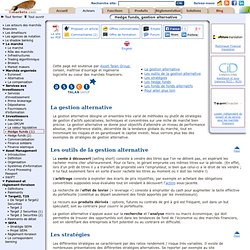
La gestion alternative désigne un ensemble très varié de méthodes ou plutôt de stratégies de gestion d'actifs spécialisées, techniques et concentrées sur une niche de marché bien précise. La gestion alternative se donne pour objectifs d'atteindre un niveau de performance absolue, de préférence stable, décorrélée de la tendance globale du marché, tout en minimisant les risques et en garantissant le capital investi.
Nous verrons plus bas des exemples de stratégies de gestion alternative. La vente à découvert (selling short) consiste à vendre des titres que l'on ne détient pas, en espérant les racheter moins cher ultérieurement. Pour ce faire, le gérant emprunte ces mêmes titres sur la période. Le recours aux produits dérivés : options, futures ou contrats de gré à gré est fréquent, soit dans un but spéculatif, soit au contraire pour couvrir le portefeuille. Hedge Fund Event Driven Strategy. > Hedge Fund Articles Home Understanding Event-Driven Investing Event-driven investing is an investing strategy that seeks to exploit pricing inefficiencies that may occur before or after a corporate event, such as a bankruptcy, merger, acquisition or spinoff.
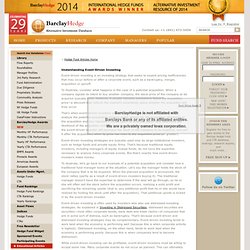
To illustrate, consider what happens in the case of a potential acquisition. When a company signals its intent to buy another company, the stock price of the company to be acquired typically rises. However, it usually remains somewhere below the acquisition price—a discount that reflects the market’s uncertainty about whether the acquisition will truly occur. That’s when event-driven investors enter the picture. Event-driven investing strategies are typically used only by large institutional investors, such as hedge funds and private equity firms.
To illustrate, let’s go back to our example of a potential acquisition and consider how a traditional fund manager looks at the situation. More articles: Hedge Fund Merger Arbitrage Strategy. > Hedge Fund Articles Home Understanding Merger Arbitrage Merger arbitrage is an investment strategy that simultaneously buys and sells the stocks of two merging companies.
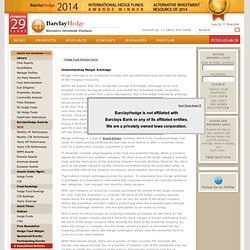
Before we explain that, let’s review the concept of arbitrage. Arbitrage, at its most simplest, involves buying securities on one market for immediate resale on another market in order to profit from a price discrepancy. But in the hedge fund world, arbitrage more commonly refers to the simultaneous purchase and sale of two similar securities whose prices, in the opinion of the trader, are not in sync with what the trader believes to be their “true value.” Hedge Fund Relative Value Arbitrage Strategy. > Hedge Fund Articles Home Understanding Relative-Value Arbitrage Relative-value arbitrage is an investment strategy that seeks to take advantage of price differentials between related financial instruments, such as stocks and bonds, by simultaneously buying and selling the different securities—thereby allowing investors to potentially profit from the “relative value” of the two securities.
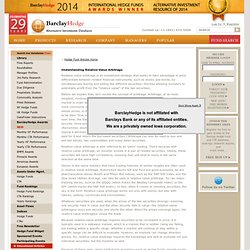
Before we explain that, let’s review the concept of arbitrage. Arbitrage, at its most simplest, involves buying securities on one market for immediate resale on another market in order to profit from a price discrepancy. But in the hedge fund world, arbitrage more commonly refers to the simultaneous purchase and sale of two similar securities whose prices, in the opinion of the trader, are not in sync with what the trader believes to be their “true value.” Relative-value arbitrage is also referred to as “pairs” trading. More articles: Long/short equity.
Long/short equity is an investment strategy[1] generally associated with hedge funds, and more recently certain progressive traditional asset managers.
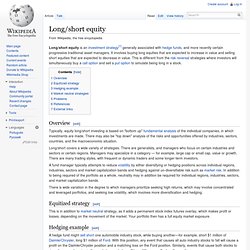
It involves buying long equities that are expected to increase in value and selling short equities that are expected to decrease in value. This is different from the risk reversal strategies where investors will simultaneously buy a call option and sell a put option to simulate being long in a stock. Overview[edit] Typically, equity long/short investing is based on "bottom up" fundamental analysis of the individual companies, in which investments are made. There may also be "top down" analysis of the risks and opportunities offered by industries, sectors, countries, and the macroeconomic situation. Long/short covers a wide variety of strategies. Hedge Fund Distressed Securities Strategy. > Hedge Fund Articles Home Investing in Distressed Securities Distressed securities may be an attractive investment option for sophisticated investors who are looking for a bargain and are willing to accept some risk.

Distressed securities are securities; most often corporate bonds, bank debt and trade claims, but occasionally common and preferred stock as well, of companies that are in some sort of distress. Typically, that means heading toward or in bankruptcy. When a company is unable to meet its financial obligations, its debt securities may be substantially reduced in value. When a company becomes distressed, the investors holding its securities often react to the possibility of bankruptcy by selling those securities at a reduced price. Investors in distressed securities must be willing to accept significant risk, however. Often, these investors—alone or in conjunction with other distressed investors—will try to influence the process by which the issuing company reorganizes.
Hedge Fund Convertible Arbitrage Strategy. > Hedge Fund Articles Home Hedge Fund Strategy - Convertible Arbitrage Convertible arbitrage is a type of equity long-short investing strategy often used by hedge funds.
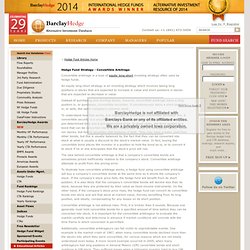
An equity long-short strategy is an investing strategy which involves taking long positions in stocks that are expected to increase in value and short positions in stocks that are expected to decrease in value. Instead of purchasing and shorting stocks, however, convertible arbitrage takes a long position in, or purchases, convertible securities. It simultaneously takes a short position in, or sells, the same company’s common stock. To understand how that works, it is important to know what convertible securities are. The idea behind convertible arbitrage is that a company’s convertible bonds are sometimes priced inefficiently relative to the company’s stock. Convertible arbitrage is not without risks. Additionally, convertible arbitrageurs can fall victim to unpredictable events. More articles: Hedge Fund Equity Long-Short Strategy. > Hedge Fund Articles Home Hedge Fund Strategy - Equity Long-Short An equity long-short strategy is an investing strategy, used primarily by hedge funds, that involves taking long positions in stocks that are expected to increase in value and short positions in stocks that are expected to decrease in value.
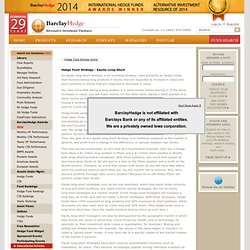
You may know that taking a long position in a stock simply means buying it: If the stock increases in value, you will make money. On the other hand, taking a short position in a stock means borrowing a stock you don’t own (usually from your broker), selling it, then hoping it declines in value, at which time you can buy it back at a lower price than you paid for it and return the borrowed shares. Hedge funds using equity long-short strategies simply do this on a grander scale. That may sound complicated, so let’s look at a hypothetical example. Hedge Fund Fixed Income Arbitrage Strategy. > Hedge Fund Articles Home Understanding Fixed-Income Arbitrage Fixed-income arbitrage is an investment strategy that exploits pricing differentials between fixed-income securities.
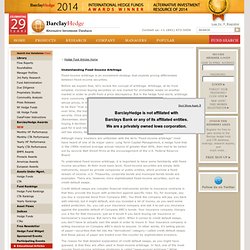
Before we explain that, let’s review the concept of arbitrage. Produit - Qu'est-ce que le Long/Short Equity ? Les Hedge Funds mettent en œuvre tout un foisonnement de stratégies d’investissement plus ou moins complexes.
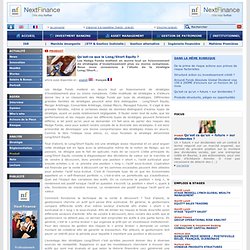
Cette multitude de stratégies a d’ailleurs donné lieu à un classement des Hedge Funds par type de stratégies. La méthode des activistes qui spéculent sur la chute des cours.